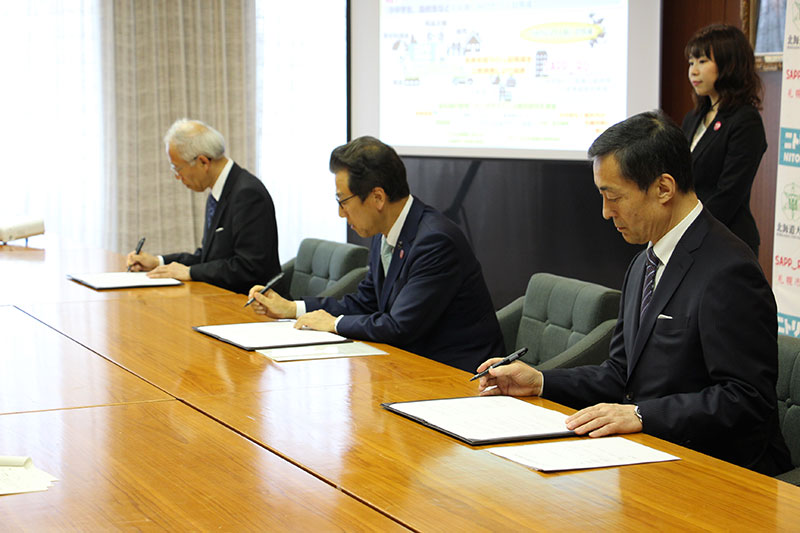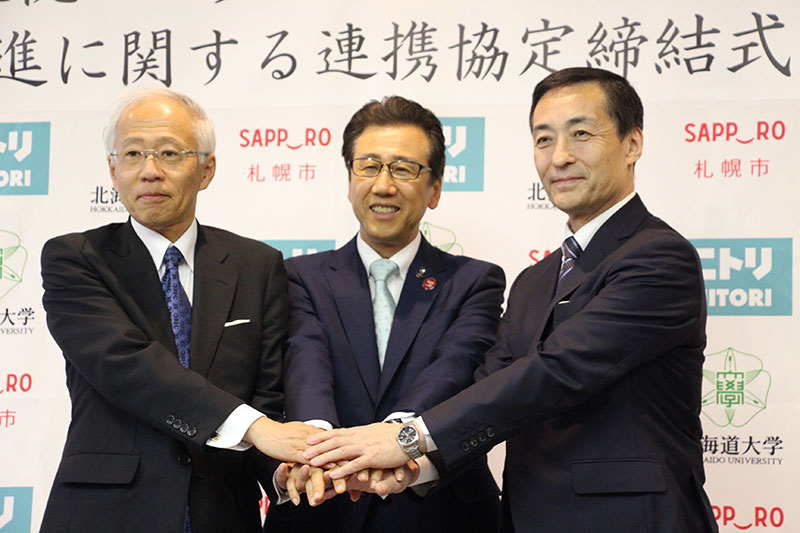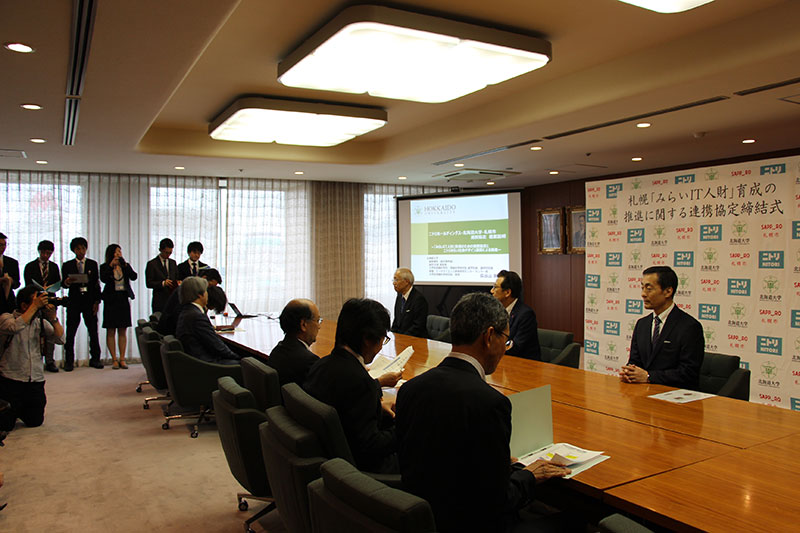Endowed Courses at University
Hokkaido University Endowed Course
"Digital transformation" refers to IT-induced fundamental changes in people's lifestyles and business models.
For the purpose of developing human resources with skills in advanced data science capable of promoting such digital transformations, Sapporo City, Hokkaido University and NITORI executed the Collaboration Agreement for Development of Sapporo "Future IT Human Resources". As part of the implementation of this collaboration, the "NITORI Future Society Design Course" was opened at Hokkaido University in August 2019.
This endowed course promotes more practical education and research activities by, for example, performing analyses using the newest mathematics and data science methods relative to business challenges of NITORI.
We hope that young people who are expected to lead the next generation will learn the essence of digital transformation through this endowed course. They, in turn, will help make Japan and the rest of the world richer as human resources skilled in advanced data science who can create the future society.
Signing Ceremony of the Collaboration Agreement for Development of Sapporo "Future IT Human Resources“
At the signing ceremony held at the Sapporo City Hall on July 24, 2019, Mayor Akimoto of Sapporo City, Mr. Kasahara, Vice President of Hokkaido University, and Mr. Shirai, President and Chief Executive Officer of NITORI Holdings Co., Ltd. signed the agreement and shook hands with one another firmly.
Under this agreement, we will conduct various initiatives to achieve further development and progress of Sapporo city and Hokkaido Prefecture through development of the "Future IT Human Resources" who will create the future Sapporo City.



University of Tokyo Endowed Course
The retail industry is inextricably linked to rest of the economy. It is affected by a wide range of factors, including manufacturers’ marketing strategies, globalization, changes in consumption structure, information technology, and structural issues in urban areas, as well as what is happening on the ground in the retail and wholesale industries. In an effort to establish an understanding of the modern-day retail industry within this broader framework, in 2015, we set up the University of Tokyo Endowed Course at the university’s Faculty of Economics.
Themed around the “scientific study of retailing” and coordinated by teaching staff, the course features lectures on retail from founders and managers within the industry, and provides students with an insight into the retail industry from the point of view of both current conditions and economics.
We hope that this course will encourage promising young talents for the future to think about the retail service industry in an economic context, and to study subjects such as chain store management and theory, so that they can have an impact in Japan and the rest of the world.
- Activities in FY2019 (Japanese language only)

- Activities in FY2018 (Japanese language only)

- Activities in FY2017 (Japanese language only)

- Activities in FY2016 (Japanese language only)

- Activities in FY2015 (Japanese language only)

Waseda University Endowed Course
Chain stores formed the cornerstone of sweeping changes to Japan’s retail and logistics industry during the postwar years and have since developed a key domestic industry.
We set up NITORI Waseda University Endowed Course at the university’s School of Commerce in the fall term of 2010 with the goal of shedding more light on the basic principles behind retailing and services, which form the backbone of chain store management, whilst drawing on extensive examples and real-world experience.
Based around the “science of retailing and services,” the course consists of talks on chain store theory from speakers who have worked on the frontline at different companies and use their real-world experience to answer the question “how has the industry overcome difficulties that it has encountered to date?”
The goal of this endowed course is for future generations to learn about the essence of chain store management and theory, so that they can play their part in improving the industry in Japan, driven by insight and hope for the future.
- Activities in FY2014 (Japanese language only)

- Activities in FY2013 (Japanese language only)

- Activities in FY2012 (Japanese language only)

- Activities in FY2011 (Japanese language only)

- Activities in FY2010 (Japanese language only)

Hokkai-Gakuen University Endowed Course
This course offers a series of 14 talks (three hours each) covering the essence of chain stores, which have become one of the key industries in Japan. It explains the principles behind chain stores using examples from the US, such as where chain stores originated, and methods such as observation, analysis and judgment, based on visits during NITORI’s annual seminars in America. The course explains NITORI’s “mission statement” of providing Japanese people with the foundation of prosperous home living on par with that in Europe and the US. The course also looks at specific goals under NITORI’s vision statement and examines the essential role of chain stores and chain store theory in achieving those goals. It also encourages students to keep on aspiring and to work hard so that they can pave the way for the future.
The aim of the course is to boldly set out a “new type of frontier in Hokkaido” for the 21st century by taking the difficult socio-economic conditions we are experiencing at present and that are expected to continue into the future, and turning them into opportunities. We hope this will help future generations of young people make a difference in Hokkaido based on their insight and hopes for the future, backed up by a high level of professional awareness.
Themed around the “scientific study of retailing and services” in fiscal 2010, the course once again focused on the theory behind chain stores, with lectures including experienced input from a dedicated teacher (Hiromi Abiko, Education & Training Dept., supervising instructor from NITORI’s seminars in America) and President Nitori himself.
